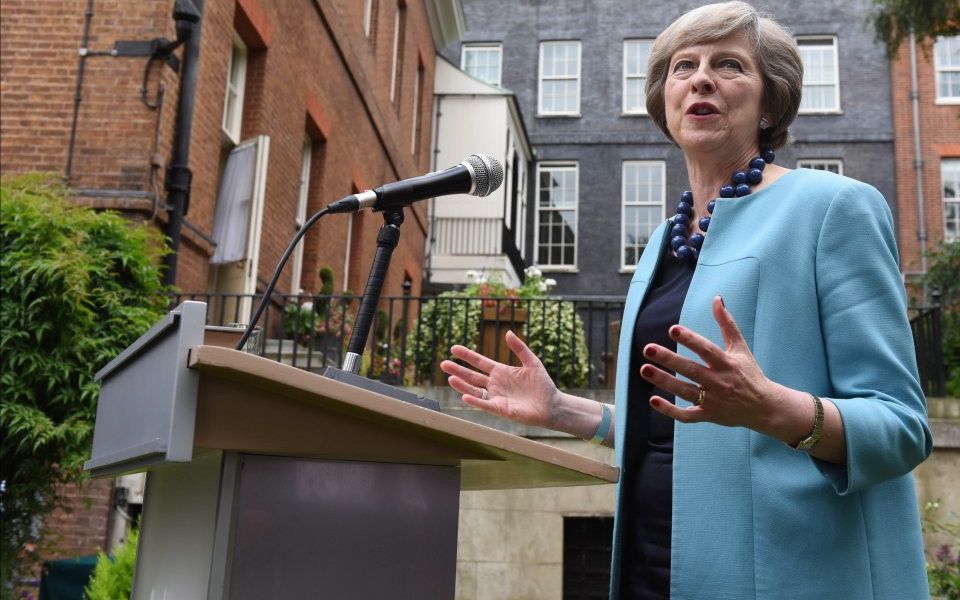Prime Minister forges ahead with Chequers’ Brexit white paper as Eurosceptic rebellion looms

The Prime Minister is pushing on with her Chequers proposals in publishing the much-awaited Brexit white paper today, as Eurosceptics plot rebellion from the backbenches.
The white paper – hailed as the most significant Brexit publication since the 2016 referendum – will set out Theresa May's vision for the UK's future relationship with the EU.
Based on the principles agreed at last week's Chequers summit, it will centre around a free trade area for goods, based on a common rulebook, in order to avoid friction at the Irish border. Alongside that is May's facilitated customs arrangement plan, in which the UK collects tariffs on behalf of the EU and "enable the UK to control its own tariffs for trade with the rest of the world"
On services, the white paper is also expected to set out how the UK can "lead a global charge to open up services markets across the globe", as trailed by chancellor Philip Hammond in his Mansion House speech last month. It also details the UK's position on security, data, science and innovation.
Despite prompting a wave of resignations, the government claims the white paper "honours the result of the referendum, and provides further impetus for the negotiations".
Three days into the job, Brexit secretary Dominic Raab will unveil the full details tomorrow morning. In a foreword, he said it would "give the UK the flexibility we need to strike new trade deals around the world, in particular breaking new ground for agreements in services".
He adds: "This is the right approach – for both the UK and for the EU… It is a vision that respects the result of the referendum, and delivers a principled and practical Brexit."
However backbench Eurosceptics yesterday unveiled their plans to derail May's proposals.
Jacob Rees-Mogg is tabling four amendments to the Cross Border Trade Bill, which is due to be debated in the Commons next week, in a bid to challenge what they blast as 'Brino' – Brexit In Name Only. They have been signed by a number of prominent MPs including former Cabinet minister Priti Patel, Bernard Jenkin and Owen Paterson.
One amendment demands May drop her plan to collect tariffs on behalf of the EU unless EU member states agree to do so in reverse.
Another – which has cross-party support – would enshrine in law that would effectively outlaw any border down the Irish sea.
A third amendment would force the government to commit to having separate VAT regime from the EU, while the fourth demands primary legislation if the UK seeks to remain in the EU’s customs union, rather than under the Henry VIII powers debated as part of the EU Withdrawal Bill.
"They clearly have a full scale rebellion on their hands," said one source. "The question is what ERG members who are also ministers will do – whether that might prompt more resignations."
Brexit minister Suella Braverman is particuarly in the spotlight. One MP told City A.M. the former ERG chair had been "getting heat" for not following colleagues David Davis and Steve Baker in quitting this weekend.
Another source said Braverman had been "virtually under house arrest, being chaperoned with a whip or some kind of minder" since the weekend to prevent further resignations.
Figures on both sides of the house thought it was unlikely the amendments would pass as Labour would "find it quite difficult to support", but there was a warning that rebels could vote against the bill at its third reading. "The government could end up losing the bills, which would be very serious," said one Labour source.
Separately, rumours have circulated that the bill may be scrapped from the schedule to avoid an embarrassing clash ahead of recess.
"Watching the halls, there are a lot of worried whips and people who are putting their names to amendment are not the sort who will be persuaded to back down. If they want to avoid a row on Monday and Tuesday they might just pull it."
But Rees-Mogg told City A.M. the majority of amendments were already government policy and should not be controversial.
But he described May's position of agreeing to become "the EU's bailiff" without a reciprocal agreement as "craven" and "very weak".
The MP added: "Chequers would keep us shackled to the EU and subject to their rule book. It is not a common rulebook it’s the EU's."
Patel added.:"The British people need firm guarantees that when we leave the EU we will have the freedom to make our own trade deals, and will not be subject to any EU control or veto. Our future prosperity rests on us being a global beacon of free trade…
"The 17.4m people who voted to leave the EU, and those who backed the Conservative manifesto, expect Britain to have those freedoms and for there to be no future EU meddling in our trade policy and economy."
Jenkin told City A.M.: "These are proposals which reflect government policy and should be perfectly acceptable to the government – unless they come up with reasons we have not considered."